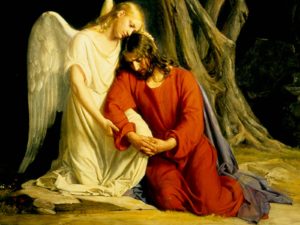Luke 22:39-431NIV New International Version Translations
39 Jesus went out as usual to the Mount of Olives, and his disciples followed him. 40 On reaching the place, he said to them, “Pray that you will not fall into temptation.” 41 He withdrew about a stone’s throw beyond them, knelt down and prayed, 42 “Father, if you are willing, take this cup from me; yet not my will, but yours be done.” 43 An angel from heaven appeared to him and strengthened him.
 Background
Background
To understand the state of mind in which Jesus was in before the Cross, proves the tremendous nature of the pending assault, and the perfect clarity of the pending pain and suffering that Jesus was about to bear. Here are three things we need to understand:
- When Christ was in His agony, preparing for His suffering and death, there appeared an angel from heaven, strengthening him. It was to be a complete humiliation for Jesus and He was to be strengthened by a ministering spirit (an angel).
- Knowing was in itself agony; he prayed more earnestly. Prayer, although always a good thing, is most appropriate when we are in agony.
- In this agony His sweat was as if it were great drops of blood falling down. This showed the painful and laborious effort His soul was going through. We should also learn to pray the same way, in deep earnest to resist against sin.
We do have to ask ourselves, Did Jesus really sweat blood?
Well, it’s important to always remember that the Bible was not written in English. We are constantly reading a translation of the words of Scripture. So, it’s important to constantly remind ourselves that the English words we are reading came from Greek words originally. But notice something. Do any of the translations say, ”His sweat became drops of blood?” No. They say, “His sweat became LIKE drops of blood.”
Now, if someone said, “your sweat is like blood!” your first reaction would not be to desperately feel your face for blood. You would immediately recognize that to say “sweating blood” is using a simile to portray the intensity of your sweat. Luke, who was a physician by trade and a masterful writer, does the same thing here! In Greek, Luke uses two particular words to make this simile: egeneto, which means “became” and hōsei, which literally means “like.” These words, when used together, clearly form a simile, a figure of speech involving the comparison of one thing with another thing of a different kind, used to make a description more emphatic or vivid.
Items for Discussion
- What makes you sweat besides heat?
- Can you think of times when some pending event was so emotional that you were driven to prayer?
- Do you believe in angels? Why or why not?
- How would you describe Jesus’ attending angel? What would you conclude from the use of the term “angel” instead of words like Holy Spirit?
- Why do you think Jesus knelt to pray?
- Where did Jesus’ strength come from? Why is this important for us to remember?
- What can we learn from Jesus’ prayer?
- Purpose: Pray that You Resist Temptation (22:40)
- Humility: Kneeling in Prayer (22:41)
- Addressed to whom: Father (22:42)
- Conditions: If You Are Willing (22:42b)
- Petition: Take This Cup from Me (22:42c)
Discussion Challenge
- The prayers of a congregation and its individuals may be the greatest source of power for the Christian church. How do we encourage more?
- 1NIV New International Version Translations
